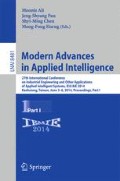Abstract
The winner determination problem (WDP) in combinatorial double auctions suffers from computation complexity. In this paper, we attempt to solve the WDP in combinatorial double auctions based on an agent learning approach. Instead of finding the exact solution, we will set up a fictitious market based on multi-agent system architecture and develop a multi-agent learning algorithm to determine the winning bids in the fictitious market to reduce the computational complexity in solving the WDP in combinatorial double auctions. In the fictitious market, each buyer and each seller is represented by an agent. There is a mediator agent that represents the mediator. The issue is to develop learning algorithms for all the agents in the system to collectively solve the winner determination problem for combinatorial double auctions. In this paper, we adopt a Lagrangian relaxation approach to developing efficient multi-agent learning algorithm for solving the WDP in combinatorial double auctions. Numerical results indicate our agent learning approach is more efficient than the centralized approach.
Access this chapter
Tax calculation will be finalised at checkout
Purchases are for personal use only
Preview
Unable to display preview. Download preview PDF.
References
Andersson, A., Tenhunen, M., Ygge, F.: Integer programming for combinatorial auction winner determination. In: Proceedings of the Seventeenth National Conference on Artificial Intelligence, pp. 39–46 (2000)
Beard, R.W., McLain, T.W., Goodrich, M.A., Anderson, E.P.: Coordinated target assignment and intercept for unmanned air vehicles. IEEE Transactions on Robotics and Automation 18(6), 911–922 (2002)
de Vries, S., Vohra, R.V.: Combinatorial Auctions: A Survey. INFORMS Journal on Computing (3), 284–309 (2003)
Perugini, D., Lambert, D., Sterling, L., Pearce, A.: From Single Static to Multiple Dynamic Combinatorial Auctions. In: IEEE/WIC/ACM International Conference on Intelligent Agent Technology, September 19-22, pp. 443–446 (2005)
Fujishima, Y., Leyton-Brown, K., Shoham, Y.: Taming the computational complexity of combinatorial auctions: Optimal and approximate approaches. In: Sixteenth International Joint Conference on Artificial Intelligence, pp. 548–553 (1999)
Fisher, M.L.: Lagrangian relaxation method for solving integer programming problems. Management Science 27, 1–18 (1981)
Gonen, R., Lehmann, D.: Optimal solutions for multi-unit combinatorial auctions: branch and bound heuristics. In: The Proceedings of the Second ACM Conference on Electronic Commerce (EC 2000), pp. 13–20 (2000)
Guo, Y., Lim, A., Rodrigues, B., Tang, J.: Using a Lagrangian heuristic for a combinatorial auction problem. In: Proceedings of the 17th IEEE International Conference on Tools with Artificial Intelligence (2005)
Murphey, R.A.: Target-based weapon target assignment problems. In: Pardalos, P.M., Pitsoulis, L.S. (eds.) Nonlinear Assignment Problems: Algorithms and Applications, pp. 39–53. Kluwer Academic Publishers, Dordrecht (1999)
Hoos, H.H., Boutilier, C.: Solving combinatorial auctions using stochastic local search. In: Proceedings of the Seventeenth National Conference on Artificial Intelligence, pp. 22–29 (2000)
Hsieh, F.-S.: Combinatorial reverse auction based on revelation of Lagrangian multipliers. Decision Support Systems 48(2), 323–330 (2010)
Ahuja, R.K., Kumar, A., Jha, K., Orlin, J.B.: Exact and heuristic methods for the weapon-target assignment problem. Technical Report #4464-03, MIT, Sloan School of Management Working Papers (2003)
Jones, J.L., Koehler, G.J.: Combinatorial auctions using rule-based bids. Decision Support Systems 34, 59–74 (2002)
Pekeč, A., Rothkopf, M.H.: Combinatorial auction design. Management Science 49, 1485–1503 (2003)
Polyak, B.T.: Minimization of Unsmooth Functionals. USSR Computational Math. and Math. Physics 9, 14–29 (1969)
Rothkopf, M., Pekeč, A., Harstad, R.: Computationally manageable combinational auctions. Management Science 44, 1131–1147 (1998)
Sandholm, T.: An algorithm for optimal winner determination in combinatorial auctions. In: Proc. IJCAI 1999, Stockholm, pp. 542–547 (1999)
Sandholm, T.: Algorithm for optimal winner determination in combinatorial auctions. Artificial Intelligence 135(1-2), 1–54 (2002)
Sandholm, T.: Approaches to winner determination in combinatorial auctions. Decision Support Systems 28, 165–176 (2000)
Vemuganti, R.R.: Applications of set covering, set packing and set partitioning models: a survey. In: Du, D.-Z. (ed.) Handbook of Combinatorial Optimization, vol. 1, pp. 573–746. Kluwer Academic Publishers, Netherlands (1998)
Yanga, S., Segrea, A.M., Codenottib, B.: An optimal multiprocessor combinatorial auction solver. Computers & Operations Research 36, 149–166 (2007)
Xia, M., Stallaert, J., Whinston, A.B.: Solving the combinatorial double auction problem. European Journal of Operational Research 164, 239–251 (2005)
Hsieh, F.-S., Lin, J.-B.: Assessing the benefits of group-buying based combinatorial reverse auctions. Electronic Commerce Research and Applications 11(4), 407–419 (2012)
Hsieh, F.-S., Lin, J.-B.: Virtual enterprises partner selection based on reverse auction. International Journal of Advanced Manufacturing Technology 62, 847–859 (2012)
Gordon, G.J., Varakantham, P.R., Yeoh, W., Lau, H.C., Aravamudhan, A.S., Cheng, S.-F.: Lagrangian relaxation for large-scale multi-agent planning. In: Proceedings of the 11th International Conference on Autonomous Agents and Multiagent Systems (AAMAS 2012), vol. 3, pp. 1227–1228 (2012)
Geoffrey, J.: Gordon, Agendas for multi-agent learning. Artificial Intelligence 171(7), 392–401 (2007)
Akella, R., Kumar, P.R.: Optimal control of production rate in a failure-prone manufacturing systems. IEEE Transactions on Automatic Control 31(2), 116–126 (1986)
Gershwin, S.B.: Manufacturing Systems Engineering. Prentice-Hall, Englewood Cliffs (1994)
Kimemia, J., Gershwin, S.B.: An algorithm for the computer control of a fexible manufacturing system. IIE Transactions 15(4), 353–362 (1983)
Kumar, P.R.: Re-entrant lines. Queueing Systems: Theory and Applications 13, 87–110 (1993)
Altman, E., Boulogne, T., El Azouzi, R., Jiménez, T., Wynter, L.: A survey on networking games in telecommunications. Computers and Operations Research 33(2), 286–311 (2005)
Altman, E., Shimkin, N.: Individual equilibrium and learning in processor sharing systems. Operations Research 46, 776–784 (1998)
La, R., Anantharam, V.: Optimal routing control: Repeated game approach. IEEE Transactions on Automatic Control 47(3), 437–450 (2002)
Orda, A., Rom, R., Shimkin, N.: Competitive routing in multi-user communication networks. IEEE/ACM Trans. Networking 1(5), 510–521 (1993)
Roughgarden, T.: Selish Routing and the Price of Anarchy. MIT Press, Cambridge (2005)
Author information
Authors and Affiliations
Editor information
Editors and Affiliations
Rights and permissions
Copyright information
© 2014 Springer International Publishing Switzerland
About this paper
Cite this paper
Hsieh, FS., Liao, CS. (2014). Multi-agent Learning for Winner Determination in Combinatorial Auctions. In: Ali, M., Pan, JS., Chen, SM., Horng, MF. (eds) Modern Advances in Applied Intelligence. IEA/AIE 2014. Lecture Notes in Computer Science(), vol 8481. Springer, Cham. https://doi.org/10.1007/978-3-319-07455-9_1
Download citation
DOI: https://doi.org/10.1007/978-3-319-07455-9_1
Publisher Name: Springer, Cham
Print ISBN: 978-3-319-07454-2
Online ISBN: 978-3-319-07455-9
eBook Packages: Computer ScienceComputer Science (R0)

